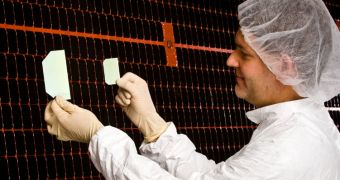Sylmar, California-based Spectrolab Inc. has produced its 3 millionths multi-junction, space-based solar cell, after 15 years of being in business. The milestone is an indicators of the boom the satellite industry has been experiencing over these past years.
The corporation is a wholly-owned subsidiary of The Boeing Company, which has been involved in the space industry for decades. According to its records, the solar cell that marked the 3-million threshold was sent out on the week October 25-31.
Producing these tools is not the main activity at Spectrolab, as the company has been involved in space-related missions for close to 50 years, providing high-quality products for its customers.
“Congratulations to Spectrolab for this remarkable achievement. Our customers expect flawless satellites that can endure many years in space to enable national-security and Earth-observation missions, as well as consumer and business communications,” says Craig Cooning.
“Spectrolab's solar cells have powered more than 500 satellites and interplanetary missions,” adds the official, who is the vice president and general manager of Boeing Space & Intelligence Systems.
The company has been in business since 1956, and one of its products was installed on the Moon during the Apollo 11 mission, back in 1969.
Both Mars Exploration Rovers feature panels built by Spectrolab, as does a NASA orbiter around the Red Planet. Its solar cells will also go on the future NASA Juno mission to Jupiter.
All panels on the International Space Station (ISS) come from the company too, and about 60percent of all satellites in orbit can harness sunlight due to the engineering expertise at Boeing.
“Many years of continuous improvement in product design and high-volume manufacturing experience have allowed Spectrolab to develop mature, cost-effective and repeatable processes, resulting in the delivery of high-quality, reliable and affordable products to both space and terrestrial customers,” says David Lillington.
“Our business continues to grow as we gain market share. We are increasing productivity and introducing higher levels of automation to meet this increased demand,” adds the official.
“We expect to announce the production start of our next-generation space cells early next year,” adds Lillington, who is the president of Spectrolab.

 14 DAY TRIAL //
14 DAY TRIAL //